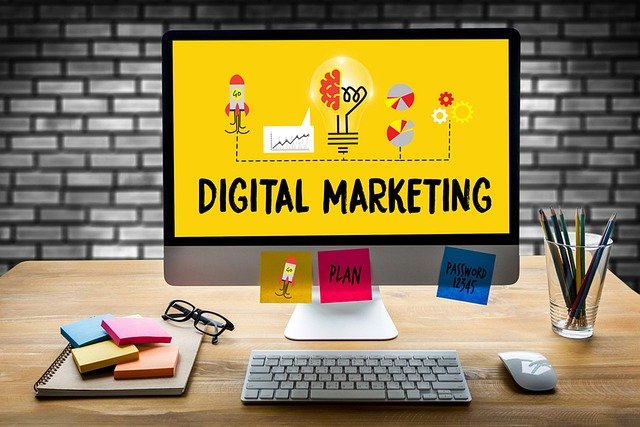Introduction
The advertising of goods or services using digital channels—such as websites, email, social media, and search engines—to reach new clients is known as digital marketing.Digital marketing is the practice of advertising goods and services using websites, email, social media, and search engines. Using strategies like SEO, content marketing, PPC, and analytics, it makes use of digital platforms to connect and interact with target audiences in order to increase traffic, lead generation, and revenue.

Importance of Digital Marketing in today’s business landscape
In the current corporate environment, digital marketing is essential since it enables organisations to target certain demographics, reach a worldwide audience, and track the efficacy of their campaigns in real time. It increases online sales, improves client interaction, and provides affordable advertising. Businesses need to use digital marketing strategies in order to be competitive and relevant in the age of e-commerce and digital platforms.
What does a digital marketer do?
A digital marketer is responsible for promoting products, services, or brands through various digital channels. Their primary goal is to reach potential customers and drive conversions using online platforms. Here are some key tasks a digital marketer typically performs:
Developing Strategies : Creating comprehensive digital marketing plans to achieve business goals.
Content Creation : Producing engaging and relevant content, such as blog posts, videos, and social media updates, to attract and retain customers.
SEO Optimization : Improving website visibility on search engines through on-page and off-page SEO techniques.
Managing Social Media : Handling social media accounts, creating posts, engaging with followers, and running paid campaigns.
Email Marketing : Building email lists, crafting email campaigns, and analyzing their performance to nurture leads and retain customers.
PPC Advertising : Running pay-per-click campaigns on platforms like Google Ads and social media to drive targeted traffic to the website.
Analytics and Reporting : Using tools like Google Analytics to track and measure the performance of marketing campaigns and making data-driven decisions.
Market Research : Conducting research to understand the target audience, market trends, and competitors.
Conversion Rate Optimization : Improving the website and marketing funnels to increase the percentage of visitors who complete desired actions.
Collaboration : Working with other teams such as sales, product development, and customer service to ensure cohesive marketing efforts.
Overall, a digital marketer leverages various online tools and platforms to create and implement strategies that increase brand awareness, drive traffic, and boost sales.

In a typical day, a digital marketer might handle any of these responsibilities:
- Posting on social media
- Approving marketing copy
- Planning email campaigns
- Managing influencer relationships
- Running analytics reports
- Updating website code
- Researching online trends
- Tracking sales funnels
Related : Top 10 Benefits of remote work
How to become a digital marketer?
To become a digital marketer, follow these steps:
Educate Yourself : Learn about digital marketing through online courses, blogs, and books.
Gain Practical Experience : Start a blog, manage social media accounts, or intern with a marketing firm.
Master Key Tools: Familiarize yourself with tools like Google Analytics, SEO tools, and social media platforms.
Stay Updated : Keep up with the latest trends and changes in digital marketing.
Network: Join marketing communities and attend industry events.
Get Certified : Earn certifications from platforms like Google, HubSpot, and Facebook.
Build a Portfolio : Showcase your work and results to potential employers or clients.
Digital marketing specialization
Digital marketing specialization involves focusing on specific areas within digital marketing to develop deep expertise. Key specializations include:
SEO (Search Engine Optimization): Optimizing websites to rank higher in search engine results.
Content marketing: Creating and distributing valuable content to attract and engage audiences.
Social Media Marketing: Using social platforms to promote brands and engage with customers.
PPC (Pay-Per-Click) Advertising: Managing paid advertising campaigns on search engines and social media.
Email marketing: Sending targeted email campaigns to nurture leads and retain customers.
Analytics: Analyzing data to measure performance and inform strategy.
Affiliate Marketing: Partnering with affiliates to promote products and earn commissions.
FAQS
What soft skills do you need to be a digital marketer?
To create engaging content, a digital marketer needs to be creative. They also need to think analytically to interpret data, communicate clearly, stay up to date on trends, solve problems when handling campaign issues, manage their time well to handle multiple projects, and work in a team to collaborate with various departments. These soft abilities guarantee marketing tactics that are innovative and successful.
How long does it take to become a digital marketer?
The average time to become a digital marketer is between six months and two years, depending on background knowledge, commitment, and available resources. Acquiring real-world experience, earning credentials, and being current with trends expedites the process and facilitates a more seamless entry into the sector.

